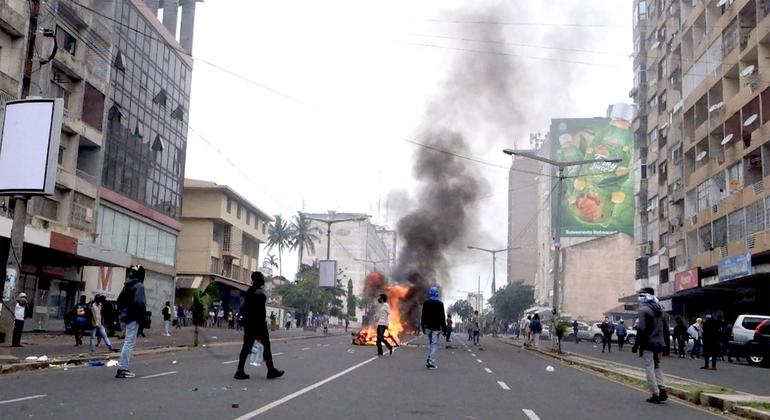Weeks of violent protests have marked the outcome of the disputed 9 October presidential elections in Mozambique, which saw ruling party Frelimo candidate Daniel Chapo emerge the winner amid widespread allegations of fraud. Frelimo has held power in the country since 1975, and the recent election results have sparked outrage and unrest among the population.
Multiple news reports have indicated that violent and repressive measures were used by security forces against protesters who were taking part in peaceful demonstrations that continued until 7 November. These actions resulted in at least 30 deaths, including that of a child, and left a further 200 individuals injured. Additionally, at least 300 protesters have been arrested in connection with the demonstrations.
Authorities responded to the protests by deploying the military to quell the unrest. Despite these efforts, protest leaders have announced multiple phases of demonstrations, including at provincial capitals and border crossings. The ongoing demonstrations have also reportedly led to reprisals against suspected police officers, including at least one killing, according to authorities.
The violence and human rights violations occurring in Mozambique have been condemned by independent experts appointed by the Human Rights Council. They have called on the Mozambican authorities to promptly and impartially investigate all unlawful killings that have taken place during the protests.
The protests arose as citizens questioned the integrity of the election process, which was marred by accusations of irregularities. There is a call for authorities to take steps to halt the violence and ensure an environment in which all Mozambicans, including women and girls, can participate fully and equally in the political processes without fear.
Reports of restrictions on media freedoms have also emerged, including attacks, intimidation, and harassment of journalists, as well as intermittent internet and mobile network blockages. Human rights defenders who have reported on election irregularities or participated in protests have faced intimidation and threats.
The rights experts have emphasized the obligation of law enforcement personnel to respect and protect individuals exercising their right to peaceful assembly. They must remain neutral and impartial during protests, preventing harm and safeguarding the right to life, liberty, and security of those involved.
The experts have urged Mozambican authorities to facilitate access to information for all citizens and strongly condemned the widespread disruption of internet services. They have warned that enforced disappearances and acts of violence related to electoral disputes could have lasting consequences on the country’s democratic framework.
Ongoing dialogue between the UN experts and Mozambican authorities aims to address the human rights violations and violence that have occurred in the aftermath of the disputed election. The situation in Mozambique remains tense and uncertain as the government grapples with the fallout from the protests and the allegations of electoral fraud.
The international community has also expressed concern over the deteriorating human rights situation in Mozambique and has called for a peaceful resolution to the crisis. The violent protests and repressive measures used by security forces have raised alarm bells among human rights organizations and advocacy groups, who are closely monitoring the situation and advocating for justice and accountability for the victims of the violence.
As Mozambique grapples with the aftermath of the disputed election and the ongoing protests, it is crucial for the government to uphold its obligations to respect and protect the human rights of all its citizens. The international community stands ready to support efforts to promote peace, justice, and reconciliation in Mozambique as the country navigates this challenging period in its history.









